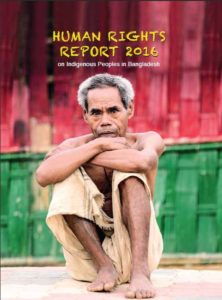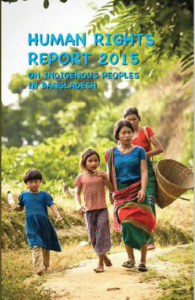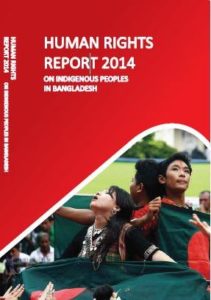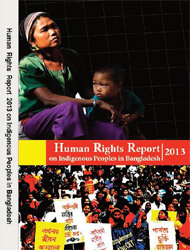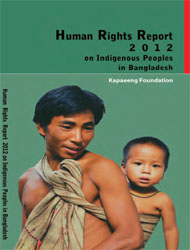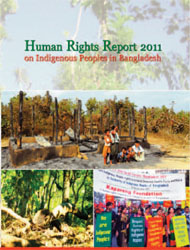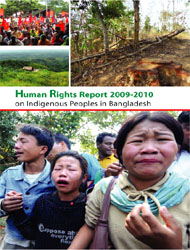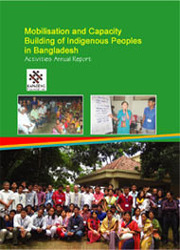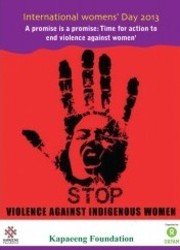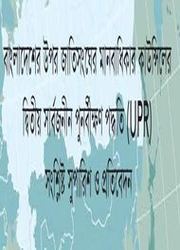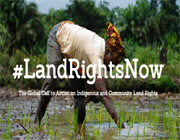CHT Civil societiesdemand postponement of setting up of a University and a Medical College at Rangamati andwithdrawal of the prejudiced order of the Ministry of Home with regard to the CHT
Civil Society Members in the Chittagong Hill Tracts (CHT) demanded deferment of the establishment of a University and a Medical College at Rangamati and the withdrawal of Home Ministry’s order requiring any national/foreign organizations or individuals to ensure the presence of administration/army/BGB while interviewing or interacting with any tribal/indigenous person, and foreign nationals willing to visit the CHT to apply for approval to the Home Ministry one month before the intended visit.
This demand was raised by the CHT civil society in a press conference organized on 20 February 2015 from 10-30 am to 12-00 noonat Sabarang Restaurant of Rajbari Road inRangamati.The written press statement was read out by Mr. GoutamDewan, president of the Chittagong Hill Tracts Citizens’ Committee and ex-chairman of the Rangamati Hill District Local Government Council. The press conference was also addressed, among others, by Dr. ManikLalDewan, formar dean of Mymensingh Agriculture University and ex-chairman of Rangamati Hill District Council; Mr. U KZan, retired Joint Secretary & formerly Director General of Prime Minister’s Office and Mr. ZumLianAmlaiBawm, president of Bawm Social Council on behalf of Rangamati, Khagrachari, and Bandarban Hill District respectively.
In all 50 senior citizens of the three hill districts were present in the press conference. Prominent among them, to name a few, were Prof. MongShanoo Chowdhury, retired Additional SecretaryMr. Tara CharanChakma, retired Deputy Secretary Mr. PrakritiRanjanChakma, Prof. BodhisattaDewan, Prof. MadhumangalChakma, Advocate JnanenduBikashChakma, retired District Education Officer Ms. AnjulikaKhisa, member of National Human Rights CommissionMs. NirupaDewan, and chairmen of Barkal and JurachariUpazilaParishads.
Questions from the pressmen were answered by Mr. GoutamDewan, member of the CHT Regional Council Mr. Sneha Kumar Chakma, educationist MongShanoo Chowdhury, women leader Ms. NamitaChakma etc.
With the conclusion of the press conference two memorandums, (1) postponement of the process of setting up of a University and a Medical College at Rangamati, and (2) withdrawal of the order from the Home Ministry prohibiting any national/foreign organizations or individuals from interviewing or interacting with any tribal/indigenous hill man without the presence of administration/army/BGB, and requiring any foreign nationals willing to travel to the CHT to apply,a month before their travel, to the Home Ministry for approval,were submitted,signed by 50 senior citizens of the CHT present in the press conference, to the Prime Minister through the Deputy Commissioner of Rangamati Hill District.
Process of setting up of a University and a Medical College at Rangamati
The government of Bangladesh has initiated the establishment of a University of Science & Technology and a Medical College at Rangamati. To this end in view, the government had enacted the Rangamati Science & Technology University Act, 2001 without having any consultation, as mandated by law, with the CHT Regional Council. Along with the University, the establishment of a Medical College at Rangamati is also underway. Founding a University and a Medical College in the CHT is undoubtedly a positive move. However, the controversy arises when these two higher educational institutions are being established with the declared objective to benefit the CHT permanent residents, but two of their representative institutions such as the CHT Regional Council (CHTRC) and the three Hill District Councils (HDCs) were not consulted with for their opinion and agreement. Moreover, the central or the key elements of the CHT Accord are yet to be implemented. Following the non-implementation of the CHT Accord fully and in appropriate manner, hosts of negative pressures are in operation posing big challenges to popular and equitable development in the CHT. Under the circumstances, the members of the civil societies in the CHT have been calling for to defer the establishment of these two highly specialized higher educational institutions, pending fulfillment of certain pre-conditions.
It was not only regretful and disturbing that the government, defying the opposition of the people from all walks of life in the CHT, pushed through the program to set up a Medical College at Ranagamti on 10 January 2015 and which helped provoke the violence to occur. The violence left at least 30 people injured prompting the local administration to impose section 144 followed by clamping of curfew as the situation deteriorated. Hardly had the heat arising out of the controversy centering on the founding of a University and a Medical College settled down, the government came up with a circular announcing the proceedings for admission in the University. As a result, anxiety and apprehension has gripped the CHT people.
Article 1 of Part A of the CHT Accord reads: “Both the sides (the government & the PCJSS) have recognised the need for protecting the characteristics and attaining overall development of the region considering Chittagong Hill Tracts as a tribal inhabited region.” In pursuance of this article, any measures taken should be intended to ensure the tribal inhabited character of the region. Accordingly, the special administrative structure of the CHT, its typical demographic composition, land & environment including its distinctive social, cultural, political and economic perspectives should be taken into consideration while embarking on developmental activities of any kinds in the CHT. Unfortunately, the members of civil societies in the CHT are inclined to believe that these important issues of public interests in connection with the establishment of a University and a Medical College have been taken into account.
Furthermore, the CHTRC and the HDCs have not been evolved into strong and effective institutions of a special CHT administrative system following the non-implementation of the key features of the CHT Accord. The land issue, the critical of all the CHT issues, has yet to be resolved. All of the Internally Displaced Persons (IDP) and most of the India Returnee Jumma Refugees could not return to their rightful lands as of now. The serious elements that are critically harming the tribal characteristics of the CHT still remain vigorously operative. The civil societies in the CHT are, therefore, extremely apprehensive that the setting up of University and Medical College, prior to the execution of the CHT Accord with strict attention to its detail and spirit will pave the way for creating bigger social, cultural, political and economic complicacies than helping to promote education further.
It is to be mentioned about woeful plight of education in the CHT at the primary-secondary-higher secondary level. 64 positions out of 202 sanctioned posts of Professors, Associate Professors, Assistant Professors and Lecturers in 7 Government Colleges are almost recurrently vacant. There are 457 teachers in 18 Government High Schools. But these schools run short of 143 teachers almost regularly. It means that the schools and colleges in the CHT have to function without one-third of their approved manpower. For instance, students of Dighinala Government High School are in real trouble as there are only 11 teachers out of a total of 24. There is no English teacher for teaching English (The national daily ProthomAlo, 11 February 2015). One can easily comprehend the situation of the privately run schools in the backdrop of situations prevailing in the schools run by the government. There are instances of private schools which have to take classes under the open sky for want of a structure to house the students. The three Government Colleges in the three Hill Districts providing Honours &Masters Courses on a limited number of subjects also suffer from acute shortage of teachers, reference materials and class rooms. Dire crisis of infrastructure, dormitories for students and teachers, learning materials and management, grips the schools and colleges. The situation with the primary education is far more vulnerable. The civil societies in the CHT feel that the government’s attempt, keeping the primary-secondary-higher and college education in such a terrible state, to imposespecialized institutionssuch as Scientific & Technical University and Medical College will aggravate the already ruinous state of education in the CHT.
Prejudiced order of the Ministry of Home with regard to the CHT
The Home Ministry in its 7 January 2015 meeting presided over by its State Minister decided, among others, to make it mandatory for any national/foreign organizations or individuals to keep the presence of administration/army/BGB at the time of their interview or interaction with any tribal/indigenous hill man, and any foreigner willing to visit the CHT to apply to the Home Ministry for its approval before a month of their visit, and to transfer the hill men police personnel working in the CHT to other districts etc. These decisions are not only unfortunate and derogatory, but equally prejudiced, biased and racist. There is no need for anynational/foreign organizations or individuals to interview or interact with any Bengali or any communal person/group in presence of administration/army/BGB in the CHT. This prohibition has been imposed on the tribal/indigenous hill men on racial ground undoubtedly. While there has been a pressing demand for a mixed police force in the CHT to deal with ethnic conflicts and law & order situation, the decision to transfer the tribal/indigenous hill men police personnel working in the CHT to other places is unfortunate and worrisome indeed. The kind of decisions taken by the Home Ministry is nothing but a sign of panic born out of mistrust which can be weighed up as has been manifested itself in the prejudiced and undemocratic policies of the State. The decision by the Home Ministry at such a time when there has been renewed initiative to amend the Land Dispute Resolution Commission Act 2001, and to devolve powers and functions on the three Hill District Councils aimed at full implementation of the CHT Accord, have enraged the civil societies in the CHT.
Demands to the Government of Bangladesh
Under the circumstances as described above, the CHT civil societies would like to put forward the following demands:
(1) Postpone the establishment of University of Science & Technology and Medical College at Rangamati;
(2) Commencing of Honours & Masters Courses on more subjects in the three Government Colleges in the CHT, increasing the “Quota” allocation of seats in other public universities & medical colleges and increased financial allocation for education in the CHT;
(3) Withdraw immediately the Home Ministry order of 7 January 2015;
(4) Implement the soonest possible and in appropriate manner the un-implemented provisions of the CHT Accord.
Click below to find the two memorandums (in Bangla) submitted to the Prime Minister:



